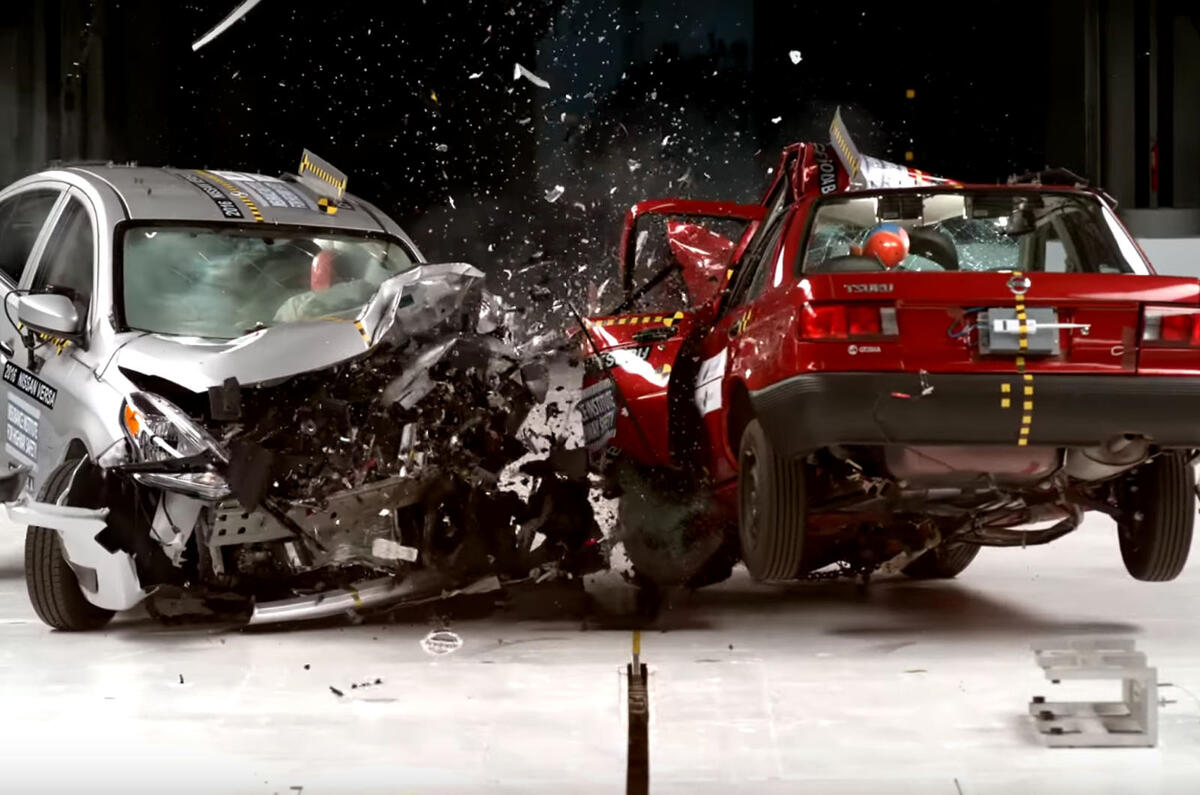A car-to-car crash test has demonstrated the huge gulf in automotive safety standards between different countries.
The test between entry-level compact saloons from Mexico and the US resulted in catastrophic damage to the Mexican car, while the American equivalent performed well.
The event in Virginia was organised by road safety organisation Global New Car Assessment Program (NCAP), along with Latin NCAP and the US Insurance Institute for Highway Safety, and involved a 2016 Nissan Versa from the USA, and a 2015 Nissan Tsuru from Mexico.
The day before the test, Nissan announced that it would stop producing the Tsuru from May next year. The Tsuru is based on a design from 1992 and was involved in more than 4000 deaths between 2007 and 2012. A previous Latin NCAP test awarded it no stars, and this latest test showed why.
After the head-on crash test, with a 50% overlap and combined closing speed of 80mph, readings from the cars’ crash test dummies showed that the Tsuru driver would likely have been killed. The driver of the five-star rated Versa – which unlike the Tsuru was fitted with standard airbags – would have suffered relatively minor injuries.
David Ward, secretary general of Global NCAP, said he hoped the test would put more pressure on manufacturers to voluntarily improve the safety of cars globally, and not wait for regulation in each country.
“It’s probably the worst result I’ve ever seen in a crash test,” he said. “The main head injury readings off the dummy in the Tsuru were completely off the scale, and in the lower leg areas. In the Versa there would have been light knee injuries and that’s all.”
Nissan were not involved in the supply of vehicles or in the test itself. Ward stressed that the event was not singling out Nissan in particular, and that similar gulfs in safety standards were found around the world from a range of manufacturers.
“Nissan have been very keen to stress the improvements that they’re making in some of their vehicles. They’ve never tried to defend the Tsuru and have acknowledged that it’s very old. They’ve been well aware of the criticism about the vehicle.
“One of the cars did really well. The Versa a very affordable car and they deserve a big pat on the back for that. It proves the point that vehicle regulations and consumer information are very powerful and successful instruments.”
The crash, hosted at the IIHS headquarters, took place in front of automotive safety industry members as well as representatives of major corporate fleets. With large corporations representing a substantial proportion of new car customers, Global NCAP is actively urging fleets to purchase only four and five star-rated vehicles.
“There’s something very visceral about a car-to-car crash test, it’s so much more like real life than crashing into a barrier,” Ward said. “You get this enormous bang and then silence. The silence is partly the audience sitting there rather stunned. It’s sobering and thought provoking.”
Ward renewed calls for manufacturers to take their own action, and also to work together and commit to improving global safety standards.




Join the debate
Add your comment
Not what they promised
androo wrote:
Its NOT obsolete ...... Nissan say they will stop production in May 2017.
So its still on sale.
Crash test.
"Two versions of the same car"?